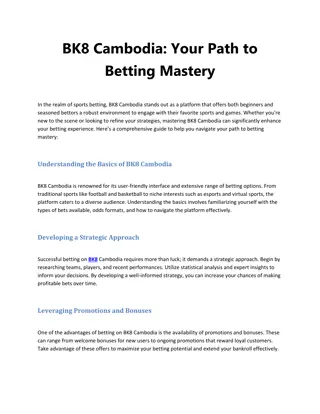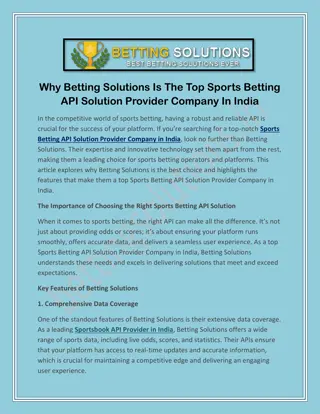Horseracing Bettors Forum: Advocating Responsible Betting
The Horseracing Bettors Forum (HBF) was established in 2015 with the assistance of the British Horseracing Authority. Comprised of diverse members, it represents bettors' interests to benefit both them and the sport. HBF ensures those who enjoy horseracing betting have a voice, promoting responsible gambling practices and engaging with industry stakeholders. Learn about horseracing and betting statistics, efforts to reduce gambling harm, the need for responsible affordability checks, and addressing account restrictions.
Download Presentation

Please find below an Image/Link to download the presentation.
The content on the website is provided AS IS for your information and personal use only. It may not be sold, licensed, or shared on other websites without obtaining consent from the author.If you encounter any issues during the download, it is possible that the publisher has removed the file from their server.
You are allowed to download the files provided on this website for personal or commercial use, subject to the condition that they are used lawfully. All files are the property of their respective owners.
The content on the website is provided AS IS for your information and personal use only. It may not be sold, licensed, or shared on other websites without obtaining consent from the author.
E N D
Presentation Transcript
Biases and Debiasing in Risk and Decision Analysis Modelling Gilberto Montibeller Dept. of Management, London School of Economics, UK & Detlof von Winterfeldt CREATE, University of Southern California, USA Montibeller & von Winterfeldt Euro 2015
Approaches to Decision Making Research Problem Frame & Structure knowledge Content Objectives & Preferences Decision Making Decision Outcomes Uncertainties & Risks Options Decision Process Normative: how should fully rational decision makers decide (Decision Theory)? Descriptive: how do real decision makers decide (Behavioural Decision Research)? Prescriptive: how can real decision makers decide better (Decision Analysis)? 2 Montibeller & von Winterfeldt Euro 2015
The Cognitive Bias Safari 89 and growing!!! 3 Montibeller & von Winterfeldt Euro 2015
Two Ways Decision Analysts Deal with Biases The easy way Biases exist and are harmful Decision analysis helps people overcome these biases The hard way Some biases can occur in the decision analysis process whenever a judgment is needed in the model and may distort the analysis Need to understand and correct for these biases in decision analysis Montibeller & von Winterfeldt Euro 2015
Judgements in Modelling Uncertainty Eliciting distributions d1 d2 dM ... U1 U2 UM Identifying Variables Ut Aggregating distributions dTe 5 Montibeller & von Winterfeldt Euro 2015
Judgements in Modelling Values Identifying objectives O Eliciting weights w1 wN w2 O1 O2 ON Eliciting value functions g1 g2 gN ... x1 x2 xN Defining attributes 6 Montibeller & von Winterfeldt Euro 2015
Identifying uncertainties Judgments in Modelling Choices X1,1 P1,1 P1,2 P1,k1 X1,2 C1 ... a1 X1, k1 X2, 1 Identifying alternatives P2,1 a2 P2,2 P2, k2 C2 X2, 2 D ... X2, k2 ... Eliciting Probabilities PZ,1 aZ XZ, 1 PZ,2 PZ, kZ CZ XZ, 2 ... Estimating Consequences XZ, kZ 7 Montibeller & von Winterfeldt Euro 2015
More vs Less Relevant Biases More Relevant Biases They occur in the tasks of eliciting inputs into a decision and risk analysis (DRA) model from experts and decision makers. Thus they can significantlydistort the results of an analysis. Less Relevant Biases They do not occur or can easily be avoided in the usual tasks of eliciting inputs for DRA Montibeller & von Winterfeldt Euro 2015
Relevant Cognitive Biases Cognitive biases are distortions of judgments that violate a normative rules of probability or expected utility Anchoring Availability Certainty effect Equalizing bias Gain-loss bias Myopic problem representation Omission bias Overconfidence Scaling biases Splitting bias Proxy bias Range insensitivity bias Montibeller & von Winterfeldt Euro 2015
Motivational Biases Motivational biases are distortions of judgments because of desires for specific outcomes, events, or actions Affect-Influenced Bias Confirmation bias Undesirability of a negative event or outcome (precautionary thinking, pessimism) Desirability of a positive event or outcome (wishful thinking, optimism) Desirability of options or choices Montibeller & von Winterfeldt Euro 2015
X1,1 P1,1 Mapping Biases P1,2 P1,k1 X1,2 C1 Eliciting Probabilities ... a1 X1, k1 X2, 1 P2,1 Anchoring bias (C) Availability bias (C) Equalizing bias (C) Gain-loss bias (C) Overconfidence bias (C) Splitting bias (C) Affect-Influenced (M) Confirmation bias (M) Desirability biases (M) a2 P2,2 P2, k2 C2 X2, 2 D ... X2, k2 aZ ... PZ,1 XZ, 1 PZ,2 PZ, kZ CZ XZ, 2 ... XZ, kZ 11 Montibeller & von Winterfeldt Euro 2015
Debiasing Older experimental literature shows low efficacy Recent literature is more optimistic Decision analysts have developed many (mostly untested) best practices, which we reviewed: Prompting Challenging Counterfactuals Hypothetical bets Less bias prone techniques Involving multiple experts or stakeholders Montibeller & von Winterfeldt Euro 2015
Our current research agenda Few attempts of assessing the effectiveness of debiasing tools in controlled experiments No previous attempt of assessing the effectiveness of sophisticated debiasing tools employed by decision analysts in practice Aim: Create a research protocol for assessing debiasing tools employed in DRA practice. 13 Montibeller & von Winterfeldt Euro 2015
Overconfidence Bias: estimates are above the actual performance (overestimation) or the range of variation is too narrow (overprecision). Evidence: Widespread occurrence in quantitative estimates (defense, legal, financial, and engineering decisions). Debiasing Tools: Probability training Start with extreme estimates, avoid central tendency anchors Use counterfactuals to challenge extremes Use fixed-value elicitations 14 Montibeller & von Winterfeldt Euro 2015
Debiasing Overconfidence: A Recent Behavioral Experiment One hundred and ten undergraduate students (Mage = 21.6) from the Polytechnic University of Turin. Elicited CDFs for 10 general questions (5 non- motivational and 5 motivational) Participants were randomly assigned to one of the four conditions: Fixed-Value vs Fixed-Probability Elicitation Counterfactuals vs Hypothetical Bets We incentivized accuracy using the Matheson and Winkler scoring rule 15 Montibeller & von Winterfeldt Euro 2015
16 Montibeller & von Winterfeldt Euro 2015
Interested on the Findings? 17 Montibeller & von Winterfeldt Euro 2015
Conclusions Relevant cognitive and motivational biases may significantly distort the decision analysis We identified these biases for each modelling step in Risk and Decision Analysis We are starting a program of evaluating the effectiveness of sophisticated debiasing tools employed by decision analysts 24 Montibeller & von Winterfeldt Euro 2015
Thank you for your attention! For more details: Montibeller and von Winterfeldt (2015). Cognitive and Motivational Biases in Risk and Decision Analysis. Risk Analysis (forthcoming) Ferretti, Guney, Montibeller and von Winterfeldt (2015). Testing Best Practices to Reduce the Overconfidence Bias in Multi-Criteria Decision Analysis. Proceedings of HICSS 2015 (under review). Contact: Dr Gilberto Montibeller Email: g.montibeller@lse.ac.uk Montibeller & von Winterfeldt Euro 2015























